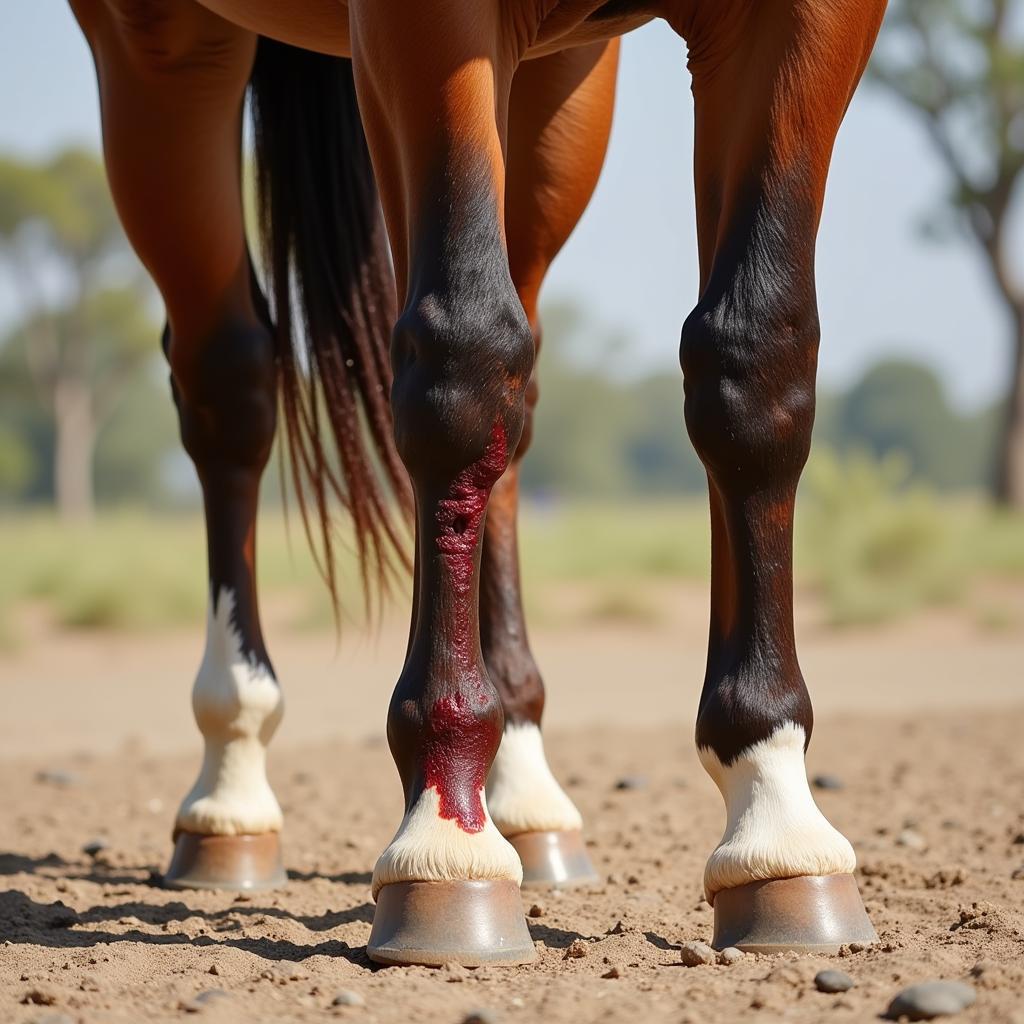Horse Rubber Bell Boots, also known as overreach boots, are an essential piece of equipment for many horse owners. These protective boots help prevent injuries to the pastern and coronary band area of a horse’s hoof, primarily caused by overreaching or interference. But with so many types and brands available, choosing the right bell boots for your horse can seem overwhelming. This comprehensive guide will delve into everything you need to know about horse rubber bell boots, from their uses and benefits to selecting the perfect fit and caring for them.
Understanding the Importance of Bell Boots for Horses
Horses can accidentally strike their front hooves with their hind hooves, especially during movement variations like cantering, jumping, or even walking. This action, called overreaching, can cause painful injuries to the delicate tissues around the pastern and coronary band. Bell boots act as a protective barrier, absorbing impact and reducing the risk of these injuries.
 Horse Overreaching Injury
Horse Overreaching Injury
Types of Horse Rubber Bell Boots
When it comes to rubber bell boots, you’ll find a wide variety designed to cater to different needs and disciplines:
- Standard Bell Boots: These are the most common type, offering basic protection for everyday use.
- No-Turn Bell Boots: Designed to prevent the boot from spinning and losing effectiveness, these are ideal for horses prone to interference.
- Vented Bell Boots: Offering increased breathability, vented boots are suitable for warmer climates or horses with sensitive skin.
- Pull-on Bell Boots: These convenient boots slip on and off easily, making them a popular choice for quick use.
- Hook-and-Loop Bell Boots: Offering a secure and adjustable fit, these boots feature hook-and-loop closures for easy on and off.
Choosing the Right Size and Fit
A proper fit is crucial for both comfort and effectiveness. Bell boots that are too loose can slip and become ineffective, while boots that are too tight can restrict movement and cause discomfort.
To determine the correct size, measure the circumference of your horse’s pastern just above the hoof. Consult the manufacturer’s size chart for the specific bell boot you are considering. Remember, different brands may have slight variations in sizing.
Caring for Your Horse’s Rubber Bell Boots
Regular cleaning and maintenance will extend the lifespan of your horse’s bell boots. After each use, remove any dirt, debris, or hair. You can wash rubber bell boots with mild soap and water, ensuring they are completely dry before storing them in a cool, dry place.
Beyond Protection: Additional Benefits of Bell Boots
While the primary function of bell boots is protection, they offer additional advantages:
- Support for Tendons and Ligaments: Bell boots can provide mild support to the tendons and ligaments in the lower leg, particularly beneficial for horses recovering from injuries or with existing conditions.
- Preventing Snowballing: In snowy or muddy conditions, bell boots can prevent snow and mud from packing into the horse’s hooves, which can lead to discomfort and even lameness.
Expert Insights: The Value of Investing in Quality Bell Boots
“As an equine veterinarian, I see firsthand the impact of proper hoof care and protection,” shares Dr. Emily Carter, DVM. “Investing in well-fitting, durable bell boots is a small price to pay for the peace of mind they provide in preventing potentially serious injuries.”
Frequently Asked Questions About Horse Rubber Bell Boots
Q: How often should I replace my horse’s bell boots?
A: Replace bell boots as they show signs of wear and tear, such as cracks, tears, or loss of flexibility.
Q: Can I use bell boots on all four hooves?
A: While primarily used on the front hooves, bell boots can be used on all four if your horse tends to overreach with their hind legs as well.
Q: Can I leave bell boots on my horse overnight?
A: It’s generally not recommended to leave bell boots on overnight as they can trap moisture and potentially lead to skin issues.
Explore More Horse Care Tips and Product Reviews
Want to learn more about protecting your equine partner? Visit our article on “what are bell boots for horses used for” for a deeper dive into the diverse applications of bell boots.
Contact Us Today
For all your horse care needs and expert advice, reach out to Justus Horses USA at:
Phone Number: 0772127271
Email: [email protected]
Address: QGM2+WX2, Vị Trung, Vị Thuỷ, Hậu Giang, Việt Nam
Our dedicated team is available 24/7 to assist you.